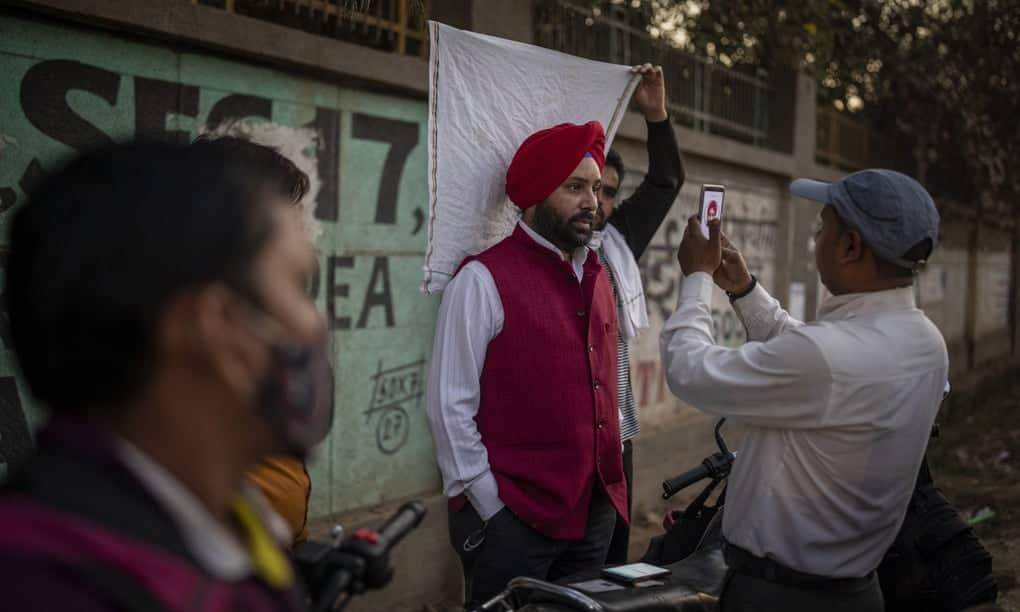'Wolf in watchdog's clothing': India's new digital media laws spark fears for freedoms
'Wolf in watchdog's clothing': India's new digital media laws spark fears for freedoms

Everything from online news to social media and streaming platforms are captured by the regulations, branded ‘palpably illegal’ by opponents
Not long before he was elected as India’s prime minister in 2014, Narendra Modi spoke of his dreams of a “digital India”, where “access to information knows no barriers”.
But this week, unprecedented barriers on every form of digital content, from online news to social media and films and television on streaming platforms, came into force, making India’s digital realm one of the most heavily regulated of any major democracy.
The series of sweeping new IT rules bring almost everything that happens online under a mechanism of government regulation, including giving the government powers to remove “objectionable” online content and erasing people’s right to privacy on social media and encrypted messaging apps like WhatsApp.
The move has provoked a huge backlash among the world of tech and media and a legal challenge against the rules was raised in Delhi high court this week by several online publishers.
“The new rules take democracy and free speech in a very alarming direction, all under the guise of promoting online safety and making India more secure,” said Riana Pfefferkorn, a research scholar at the Centre for Internet and Society at Stanford Law School.
With tech companies now ordered by the government to proactively monitor what people say on their platforms – and keep data on the identity of those users which could then be handed over to the government on demand – Pfefferkorn said it would “exert a chilling effect on what people are willing to say and do online if they know they’re being watched.”
“Providers are being pressed to take down content the Indian government deems illegal or a threat to India’s security – categories that now seem to include criticising the Modi government,” she said.
A crackdown on dissent
The government has insisted that the new rules level the playing field, and regulate online content in the same way as traditional newspapers, television and film. A press note accompanying the announcement of the rules called them “progressive” and “liberal”. “We want them to be more responsible, more accountable,” said IT minister Ravi Shankar Prasad of digital platforms.
Yet even India’s mainstream media, which is rarely outspoken against the government, expressed concern, an editorial in The Hindu newspaper called the new rules “a wolf in watchdog’s clothing” and described them as “deeply unsettling as they will end up giving the government a good deal of leverage over online news publishers and intermediaries”.
The Editors Guild of India put out a damning statement over the weekend which said the rules “fundamentally alter how publishers of news operate over the internet and have the potential to seriously undermine media freedom in India”.
Many see the rules as a continuation of Modi’s government authoritarian crackdown on dissent. Freedom of the press and freedom of expressio has been heavily curtailed since Modi’s Bharatiya Janata Party (BJP) came to power, with mainstream media largely within the government’s grasp, but it is online news platforms who have become one of the last bastions of independent journalism.
Social media, such as Twitter, is also used as a vital organising and information tool for anti-government actions, such as the huge farmers’ protests which have been going on in India since November. In turn, the government has attempted to control the platforms, by demanding for example that Twitter remove thousands of accounts critical of the government and threatening their staff with arrest if the company did not comply.
Indeed, controlling access to the digital realm has become a regular tool for curbing dissent by Modi’s government. This year, for the third year in a row, India topped the global list for most internet shutdowns, according to digital rights group Access Now. Of the 155 internet shutdowns that happened around the world in 2020, 109 of them were in India.
‘Palpably illegal’
The rules will fundamentally change how big tech companies like Facebook, which owns WhatsApp, and Twitter, operate in India, one of the world’ largest and most lucrative markets. So far the tech companies have remained quiet on whether they will comply, but internet company Mozilla said the “ripple effects of these provisions will have a devastating impact on freedom of expression, privacy and security”.
“They call these rules self-regulation,” said Prasanth Sugathan, legal director at the Software Freedom Law Centre. “But when you have a regulatory mechanism that ultimately ends with a government body who can remove any content that it decides is problematic – perhaps because it is critical of the government – then that self-regulation can quickly turn into state censorship,”
Indian digital news platforms The Wire.in and The News Minute are among those who have challenged the IT rules in court this week, in a petition presented to the Delhi high court, arguing they are “palpably illegal”.
Siddharth Varadarajan, Editor of TheWire, described the rules as an “oppressive architecture”, which, by giving the government the power to delete or modify content, granted them “powers that run counter to the constitutional guarantee of press freedom.”
“We have argued that this runs the danger of adversely affecting fundamental rights,” said Dhanya Rajendran, editor of the News Minute.
The impact of these regulations is already being felt. Streaming platforms like Amazon Prime and Netflix, which were previously outside government control, will now be subject to the same strict regulation of their content and this week, Amazon Prime cancelled two upcoming shows.
“The Indian government is trying to dictate what is and is not acceptable to say online, and inducing tech providers to censor their users as the cost of continuing to do business in India,” said Pfefferkorn.
Photo: India has rolled out new regulations for social media companies and digital streaming websites to make them more accountable for the online content shared on their platforms. Photograph: Altaf Qadri/AP
There are no comments yet. Be the first to add a comment by using the form below.













